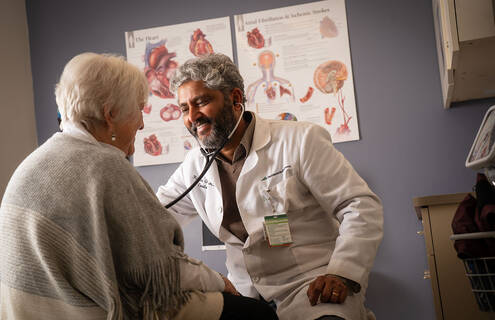
Dartmouth Health is now offering cardiac PET and will soon offer cardiac CT in southern New Hampshire, creating a new referral option for primary care providers and patients.
As part of Dartmouth Health's expansion of cardiovascular services to southern New Hampshire, residents of Concord, Manchester, Nashua, and surrounding communities now have access to advanced cardiac PET imaging services to diagnose coronary artery disease (CAD).
"Cardiac PET is a special nuclear stress test that uses a radioactive tracer to show blood flow through the coronary arteries at rest and under stress," said Dartmouth Health cardiologist Kalyan Ghanta, MD. "After taking a series of images, we administer a medication and take another series of images to assess for significant blocked arteries in the heart."
Apart from the ability to diagnose blocked arteries that supply blood to the heart, cardiac PET stress test is also used to diagnose microvascular disease, which occurs when smaller blood vessels become blocked.
"Until recently, we weren't able to diagnose microvascular disease because a regular angiogram wouldn't allow us to see blockages in small blood vessels," said Dr. Ghanta. "With cardiac PET, we identify circulation problems in the smaller blood vessels, diagnose the cause of chest pain, shortness of breath, and other symptoms, and treat microvascular disease effectively."
Another advantage of cardiac PET is that it can be done in patients who cannot exercise on a treadmill, as there is no exercise involved. When compared to other modalities of stress testing, this new technology is also much more accurate in obese patients whose BMI is 35 or above.
In addition to its cardiac PET capabilities, the team will soon begin using cardiac CT to noninvasively diagnose CAD and perform coronary calcium scoring.
"Coronary calcium scoring is a low radiation dose, low-cost, low-risk, non-contrast, noninvasive test to assess calcium buildup in the coronary arteries," said Dr. Ghanta. "The test provides a score that can predict heart attack risk in the future and is a useful tool to guide preventive strategies, especially for younger people with heart disease risk factors, such as a strong family history of premature heart attacks in young family members."
With advanced cardiac imaging now available in southern New Hampshire, Dr. Ghanta said Dartmouth Health referring providers can send patients for streamlined, comprehensive care within the same health system.